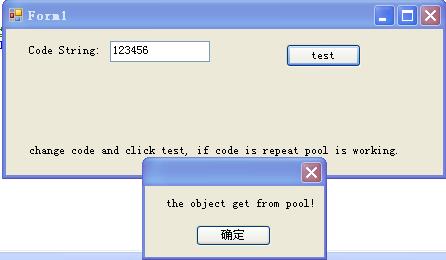
Introduction
In this article, I'm going to talk about a buffered pool of any Object and an implementation I have written in C#.
Background
Using C# for just one year helped me so much, so I hope this code can help somebody.
Before using C#, I used C++ since I was 15 years old. The segment code is part of a stock program, and I had to rewrite to generic code — you can use it in anywhere if you need it. I come from China and my English is very poor, so, sorry about the bad reading.
Using the Code
The C# code is here:
using System;
namespace Wuzhiqiang
{
interface IKnowByKey<T>
{
bool ThatIsMe(T key);
}
class PoolManagerGeneric<T,U> where T: class, IKnowByKey<U>
{
#region Variable...
private int __length = 10;
private int __count = 0;
T[] __objectPool = null;
#endregion
#region Properties...
public int Length
{
get { return __length; }
}
#endregion
#region Construct ...
public PoolManagerGeneric()
{
init();
}
public PoolManagerGeneric(int max)
{
if (max >= 5 && max <= 1000)
__length = max;
init();
}
#endregion
#region Functions ...
private void init()
{
__objectPool = new T[__length];
__count = 0;
}
public void SaveObject(T obj)
{
if (__count >= __length)
__count = 0;
__objectPool[__count++] = obj;
}
public T GetObjectByKey( U key )
{
for(int i= 0; i< __length; i++ )
{
if( __objectPool[i] != null && __objectPool[i].ThatIsMe(key))
return __objectPool[i];
}
return null;
}
#endregion
}
}
public partial class Form1 : Form
{
KLine currentkline = null;
Wuzhiqiang.PoolManagerGeneric<KLine, String> klPoolManager =
new Wuzhiqiang.PoolManagerGeneric<KLine, String>(20);
public Form1()
{
InitializeComponent();
}
private KLine LoadKLineData(String path, String code, String name, String city)
{
KLine temp = klPoolManager.GetObjectByKey(code);
if (temp == null)
{
temp = new KLine();
temp.Load(path, code, name, city);
klPoolManager.SaveObject(temp);
}
return temp;
}
private void button1_Click(object sender, EventArgs e)
{
KLine find = klPoolManager.GetObjectByKey( this.textBox1.Text);
if (find != null)
{
MessageBox.Show(" the object get from pool!");
}
currentkline = LoadKLineData( "", this.textBox1.Text, "name", "");
}
